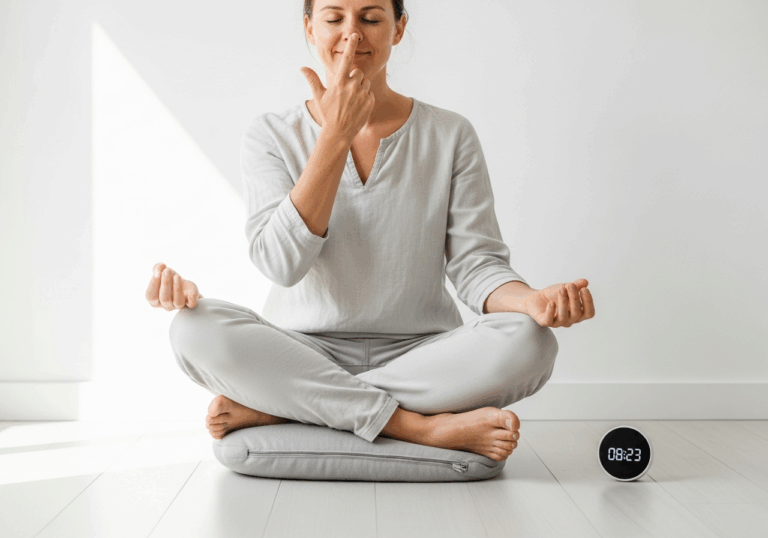Science-Backed Tips
Transforming Trauma: Breathing Techniques for Healing
Sustained resonance breathing training reduces PTSD symptoms by 40%.
📊 Did you know?
💡 Why It Matters
1️⃣
Reducing PTSD symptoms by 40% can significantly improve quality of life for affected individuals.
2️⃣
Improved HRV coherence is associated with better emotional regulation and resilience.
3️⃣
Effective non-pharmacological interventions like resonance breathing can reduce healthcare costs related to PTSD treatment.
✅ Try These Micro-Tips
🎯
Practice resonance breathing for 20 minutes daily to enhance emotional recovery.
🎯
Incorporate deep breathing exercises into your routine at least once per day.
🎯
Engage in mindfulness meditation sessions for 10 minutes to complement breathing techniques.
🎯
Track your mood and PTSD symptoms weekly to monitor progress.
📚 The study
This significant improvement in mental health was accompanied by enhanced heart rate variability (HRV) coherence, which is closely linked to better emotional regulation and resilience.
The implications of these findings are profound, as they suggest that non-pharmacological interventions like resonance breathing can play a crucial role in emotional recovery and mood healing.
By fostering physiological regulation, individuals can experience a more profound healing journey, ultimately enhancing their quality of life.
Furthermore, the potential to reduce healthcare costs associated with PTSD treatment through effective, non-drug therapies makes this research even more vital.
As we continue to explore innovative approaches to mental health, the promise of HRV biofeedback shines brightly, offering hope and healing to those affected by trauma.
❓ Frequently Asked Questions ❓
Learn more
What is resonance breathing?
Resonance breathing is a technique that involves controlled breathing patterns to enhance physiological regulation. It aims to improve heart rate variability (HRV) and emotional well-being.
How does resonance breathing help with PTSD?
Resonance breathing has been shown to reduce PTSD symptoms by approximately 40%. This technique improves HRV coherence, which aids in emotional recovery from trauma.
What is HRV coherence?
HRV coherence refers to the synchronization of heart rate variability patterns, indicating better emotional regulation. Improved HRV coherence is associated with increased resilience and mood stability.
How long should I practice resonance breathing daily?
It is recommended to practice resonance breathing for 20 minutes each day. This consistent practice can significantly enhance emotional recovery and overall well-being.
Can resonance breathing replace medication for PTSD?
While resonance breathing is an effective non-pharmacological intervention, it should not be seen as a complete replacement for medication. It can complement traditional treatments and reduce healthcare costs related to PTSD.
How can I track my progress with PTSD symptoms?
You can track your mood and PTSD symptoms weekly to monitor your progress. Keeping a journal or using an app can help you identify patterns and improvements over time.
What other techniques can I use alongside resonance breathing?
Incorporating mindfulness meditation sessions for at least 10 minutes can complement resonance breathing. Deep breathing exercises can also be beneficial when practiced at least once per day.
What are the benefits of reducing PTSD symptoms by 40%?
Reducing PTSD symptoms by 40% can significantly enhance the quality of life for affected individuals. It leads to better emotional regulation, improved relationships, and overall well-being.
How long does it take to see results from resonance breathing?
Participants in studies have shown a reduction in PTSD symptoms and improved HRV coherence after four weeks of daily resonance breathing sessions. Consistent practice is key to achieving noticeable results.
Is resonance breathing suitable for everyone?
Resonance breathing is generally safe and can benefit many individuals, especially those dealing with stress or trauma. However, it’s advisable to consult a healthcare professional before starting any new therapeutic practice.





